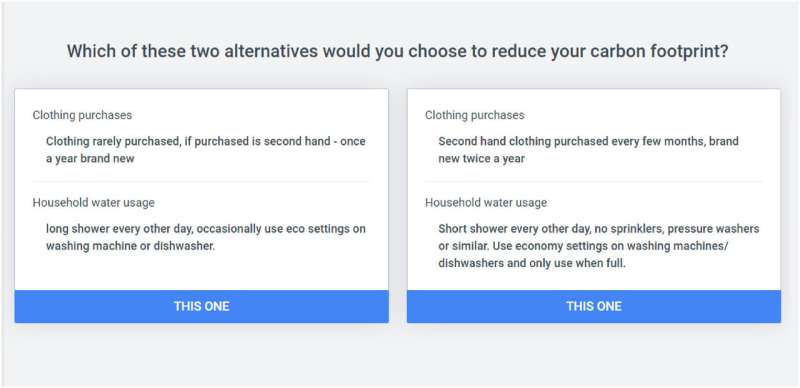This article has been reviewed according to Science X's editorial process and policies. Editors have highlighted the following attributes while ensuring the content's credibility:
fact-checked
peer-reviewed publication
trusted source
proofread
UK research finds public is climate complacent

The UK public is complacent when it comes to personal action on climate change and, without intervention, meaningful changes to lifestyles and consumption behaviors will not happen, according to new research by the University of Southampton.
Those are the findings of the first study in the UK into the deep-seated preferences of the public in terms of personal climate actions.
The study, published in the Journal of Cleaner Production, questioned hundreds of people on their attitudes to climate change and their willingness to change behaviors.
The research was led by postgraduate researcher Alice Brock and co-authored by Ian Williams, Professor of Applied Environmental Science, and Simon Kemp, Professor of Environmental Science.
Alice said, "Working out who is responsible for climate change is highly complex and highly contested. However, we must address this question if we are to find solutions.
"Households are the largest direct contributor to carbon emissions in the UK, mostly due to household heating and traveling. So, it's critical we understand our population's attitude to climate change and to making behavioral or lifestyle changes. This study is the first to get to the heart of that."
The researchers surveyed a total of 381 people in the UK (in Southampton) and found that the public are well-informed about climate change, with many demonstrating high levels of concern and anxiety—but this awareness does not necessarily translate into action.
Most respondents (315) said climate change is 'an extremely serious problem' or 'a very serious problem," and 213 people said that responsibility for addressing it lies with everybody (national and local governments, business and industry, individuals, and environmental groups), while 117 respondents said responsibility lies with the national government.
Overall, respondents were most likely to make simple low-impact changes, such as swapping out lightbulbs, cutting down on overseas travel, and being mindful of where clothing comes from. Bigger behavior changes such as changing diet or cutting down on domestic travel, as well as more expensive changes, such as replacing electrical appliances with more eco-friendly versions, were the changes people were least likely to make.
"A preference for carbon reduction behaviors that would have the lowest impact on people's day-to-day life was evident," explained Alice. "People are unwilling to make more difficult changes to their lifestyles, such as changing their diet. People's desire to carry on as normal outweighs their concern around climate change."
The research calls on those in authority—in industry and government—to take charge.
Professor Williams concluded, "People feel overwhelmed by the climate change situation and don't know where to start or which changes to make—so it must be down to someone else, such as our business and governmental leaders, to take action. Without this intervention—with initiatives such as annual personal carbon allowances—the public won't make changes in a meaningful way."
More information: Alice Brock et al, "I'll take the easiest option please". Carbon reduction preferences of the public, Journal of Cleaner Production (2023). DOI: 10.1016/j.jclepro.2023.139398
Journal information: Journal of Cleaner Production
Provided by University of Southampton





















